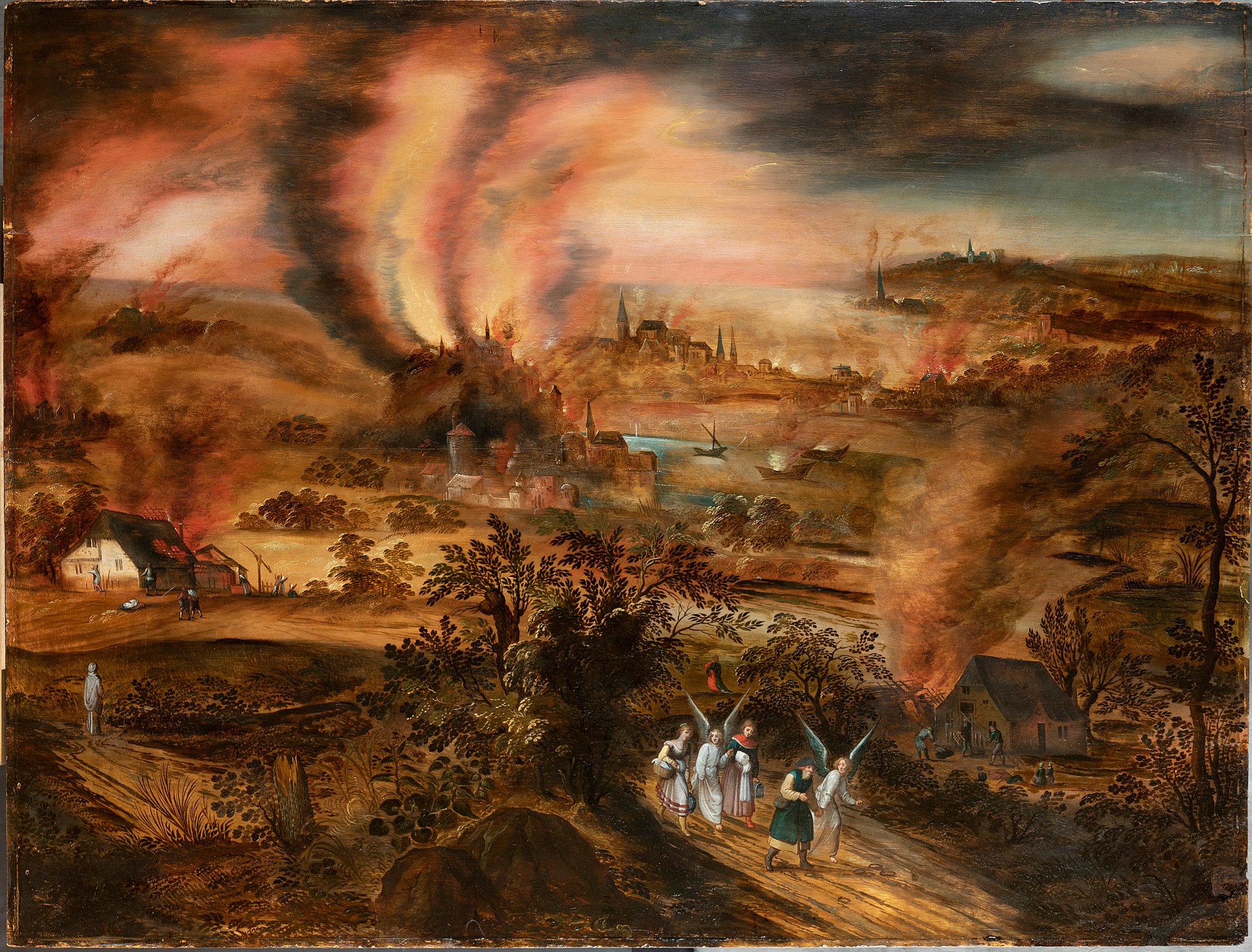“This was the guilt of your sister Sodom: she and her daughters had pride, excess of food, and prosperous ease, but did not aid the poor and needy. They were haughty, and did abominable things before me; therefore I removed them when I saw it.” (Ezek. 16:49-50)
For much of my early life, I was under the impression that the destruction of Sodom and Gomorrah in Genesis 19 was an expression of God’s wrath against people like me: gay people. I was subtly encouraged to feel little for the wicked inhabitants of those cities, while inwardly I saw myself in them.
Consequently, I felt that I could never let anyone know what I was experiencing. I wondered if God was angry with me because of feelings I could not control or erase, no matter how much I tried. I wondered if God wanted to destroy me.
Vitally important lessons from the passage went over my head, because I had misunderstood it to be about gay people. But a deeper look at the story reveals a message that all of us desperately need to hear.
Years after coming out in college, I have discovered just how much the story has to teach us about God’s righteous anger towards arrogance and violence, and about about his abundant hospitality towards us despite our weakness and failure.
To see this more clearly, the passage must be examined in its larger context. The real beginning for this episode is in Chapter 18, when three angels in the form of three men appear to Abraham “as he sat at the entrance of his tent in the heat of the day” (Gen. 18:1).
Abraham’s response to the angels reveals him to be an exceptional host. He brings out water to wash their feet after their long journey, and rushes off to prepare a feast. He tells his wife, Sarah, to prepare cakes, slaughters a young calf and brings out milk and rich cheese.
I wondered if God was angry with me because of feelings I could not control or erase, no matter how much I tried. I wondered if God wanted to destroy me.
Through the angels, God delivers a message to the elderly couple: Sarah will give birth to a son at the same time next year. The two struggle to believe—Sarah even fails to contain her laughter and is gently rebuked—but finally they accept the angelic message. Just before the guests leave, God reveals to Abraham his plans to destroy Sodom and Gomorrah, a city of extreme wickedness. An initial contrast is set up here between Abraham’s hospitality and the unnamed “sin of Sodom.”
Abraham is distraught over the fate of the cities, where he knows his nephew Lot is currently living; his care for the stranger extends to the inhabitants of the cities of the plain.
“Will you indeed sweep away the righteous with the wicked?” he asks God. “Suppose there are fifty righteous within the city; will you then sweep away the place and not forgive it for the fifty righteous who are in it? Far be it from you to do such a thing, to slay the righteous with the wicked, so that the righteous fare as the wicked!” (Gen. 18: 23-25)
God graciously agrees to relent for the sake of 50 righteous people. But Abraham does not stop there—he bargains with God until the number is reduced to a mere 10. However, the reader soon discovers that even the drastically reduced number is not met.
Two of the angels then travel directly to Sodom to rescue Lot, who greets them at the city gate. Attempting to be a good host himself, and aware of how dangerous the city could become at night, Lot urges them to stay at his own house, rather than in the city square.
He prepares a feast as well, but interestingly, the only food explicitly mentioned in the text is “unleavened bread,” perhaps indicating that the feast was not as generous as the one offered by his uncle Abraham.
Before any in the house lie down to sleep, a crowd arrives. “[T]he men of the city, young and old, all people to the last man” arrive at the front door and demand to rape the honored guests (Gen. 19:4-5). The fact that every single man from the city makes this demand suggests that this is not a group of gay men. What kind of city, in the ancient world or in any time and place, would have had an entirely gay population?
The emphasis is clearly on violent humiliation, not sexual intimacy or pleasure. The men of Sodom wish to brutalize the angels, not seduce them. What could be the motivation for wanting to humiliate the angels in this way?
Lot, for all his attempts at being a good host, utterly fails as a father when he offers the men his own young daughters instead. “Look, I have two daughters who have not known a man; let me bring them out to you, and do to them as you please; only do nothing to these men, for they have come under the shelter of my roof” (Gen. 19:8).
Lot not only struggles to be hospitable for guests, he fails to make his house safe for his own children. We get further insight into the character and motivation of these men in their response to Lot’s offer. They deride him for being a foreigner in their city and threaten to rape him. These are not gay men looking for a good time with out-of-towners. This is a hateful, violent mob.
The angels miraculously disperse the crowd with a blinding flash of light and command Lot to gather his family and flee first thing in the morning. Lot attempts to round them up that night, and only his wife and daughters wish to go with him. But even after the dawn breaks, Lot fails to act decisively. Graciously, the angels grab them all by the hand and drag them to safety outside the city gate. Lot seems maddeningly ambivalent about leaving, but God rescues him and his family from destruction.
Before leaving, the angels enjoin them to flee to the hills without looking back, and in an echo of Abraham’s bargaining with God to spare Sodom and Gomorrah, Lot bargains with the angels to allow him and his family to flee to the nearby town of Zoar instead.
The comparison is striking: Abraham bargains for mercy upon inhabitants of the cities and Lot bargains for mercy for himself. Abraham bargains for God to relent while Lot bargains for God to ease his escape. As they flee, Lot’s wife, perhaps identifying with the wicked cities, turns back one final time, and turns into a pillar of salt.
The episode concludes by returning to Abraham:
Abraham went early in the morning to the place where he had stood before the Lord; and he looked down toward Sodom and Gomorrah and toward all the land of the Plain and saw the smoke of the land going up like the smoke of a furnace. So it was that, when God destroyed the cities of the Plain, God remembered Abraham, and sent Lot out of the midst of the overthrow, when he overthrew the cities in which Lot had settled (Gen. 19:27-29).
With this full context in mind, the meaning of the destruction of Sodom and Gomorrah is, after all, summed up by the prophet Ezekiel: they “had pride, excess of food, and prosperous ease, but did not aid the poor and needy,” including the angels, who should have been honored guests. “They were haughty, and did abominable things before me,” arriving in a violent mob to gang rape visitors. “Therefore, I removed them when I saw it,” the inhospitality and disregard for foreign guests.
As followers of Christ, we know that by practicing hospitality, “many have entertained angels without knowing it,” as the author of Hebrews tells us (Heb. 13:2). John writes that “we love because he first loved us” (1 Jn. 4:19). Likewise, we invite others into our family because we have been invited into the family of God. Jesus makes it clear that what is done for “the least of these [his] siblings” is in a real sense done for him (Mt 25:40).
Our faith demands hospitality of us, especially toward the poor, the needy and the stranger.
The emphasis is clearly on violent humiliation, not sexual intimacy or pleasure. The men of Sodom wish to brutalize the angels, not seduce them.
Using the story of Sodom and Gomorrah to suggest God’s wrath against gay people makes it rather easy to avoid its actual demands to open up our wallets, homes and hearts to people in need. How many times has misunderstanding, empowered by hatred of the other, led some to use this passage to sanction everything that made Sodom guilty: kicking children of their homes, refusing to serve certain people, discriminating in housing and jobs, breaking families apart, fighting against civil rights?
If one were trying to relieve oneself of this passage’s radical demands of hospitality, twisting the story to focus on gay people would be a convenient strategy.
But as important as that message is, stopping there would keep us from the other, deeper, point of the story: God’s gracious hospitality toward us. God is obviously under no obligation to bargain with human beings, but he allows Abraham to haggle with him to save Sodom and Gomorrah. When even a handful are not found, God sets out to save Lot and his family from destruction. When Lot, who struggles as a host and fails as a father, hesitates instead of taking decisive action, God drags them all to safety, and even puts up with Lot’s complaining after the fact.
God’s call for us to show hospitality to the poor, the needy and the stranger is naturally connected to seeing ourselves as poor, needy strangers to whom God displays hospitality, despite our weakness and even our resistance. “We love because [God] first loved us” (1 Jn 4:19).
We show hospitality to others because God has shown immense hospitality to us. Our motivation for opening our wallets, homes and hearts to the poor, the needy and the stranger must not merely be a sense of guilt. We offer hospitality out of an overflow of the riches we have already been given by God.
I invite you to see yourself in the story of the destruction of Sodom and Gomorrah. I invite you to see yourself as an inhabitant of the cities, not because the story is about some divine wrath against gay people, but because a propensity toward inhospitality, pride, violence and selfishness is within all of us.
But I also invite you to see yourself in Lot, an inhabitant of the city who was saved. I invite you to consider that even when we fall short of the demands of hospitality, even when we fail in loving the poor and needy, God is gracious and hospitable, willing and able to drag us to safety and invite us into his family.





0 Comments